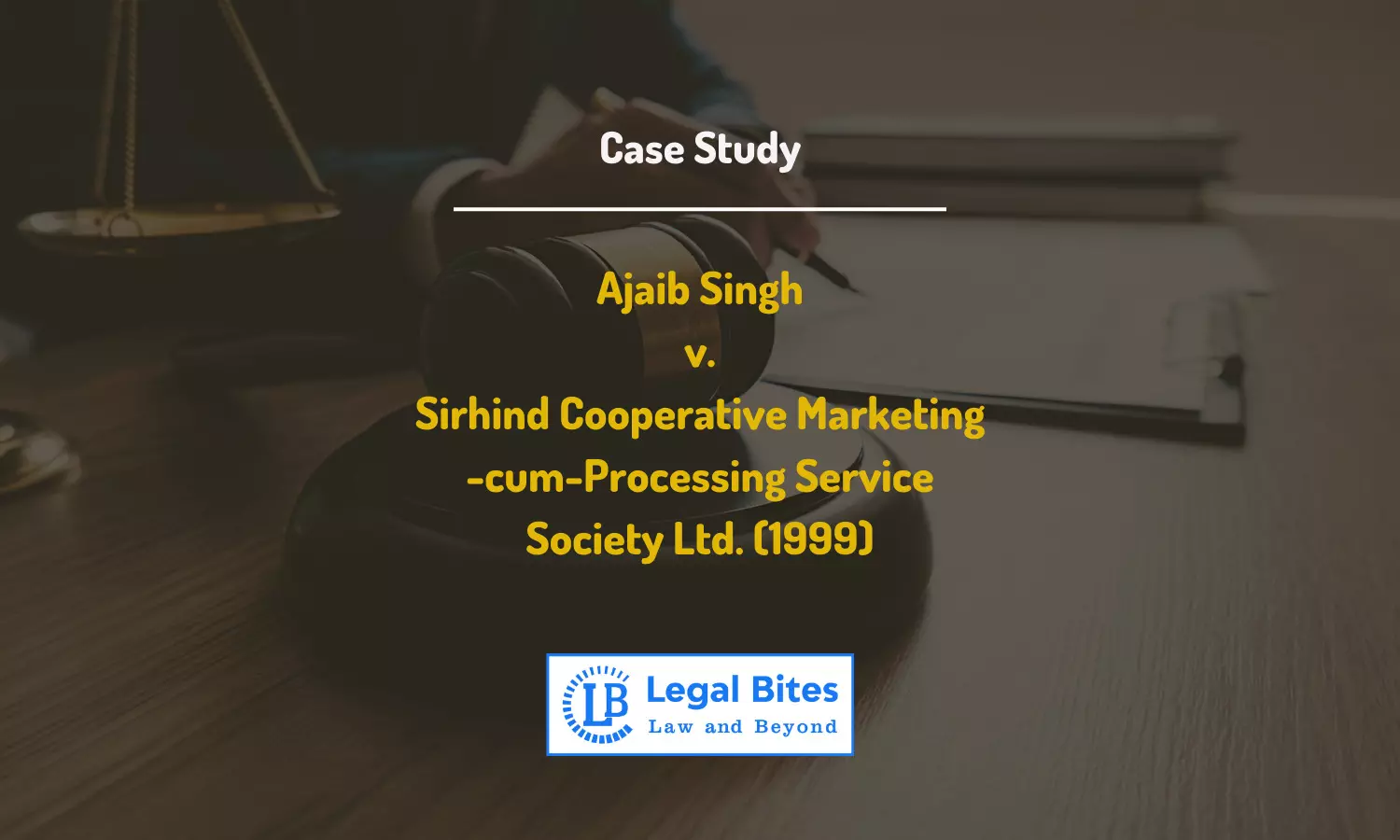Case Study: Ajaib Singh v. Sirhind Cooperative Marketing-cum-Processing Service Society Ltd. (1999) | Limitation Periods
The case examined labour rights under the Industrial Disputes Act (1947) regarding limitation periods for disputes in the Labour Court (Section 10).

The case examined labour rights under the Industrial Disputes Act (1947) regarding limitation periods for disputes in the Labour Court (Section 10).
Case Title: Ajaib Singh v. Sirhind Cooperative Marketing-cum-Processing Service Society Ltd.
Court: Supreme Court of India
Citation: AIR 1999 SC 135
Judges: Justice S. Saghir Ahmad and Justice R.P. Sethi
Date of Judgment: April 8th, 1999
Facts
- The management dismissed the services of the appellant allegedly without conforming to the compulsory provisions of the Industrial Disputes Act, 1947 (hereinafter as “1947 Act”).
- On March 19, 1982, the appropriate government referred the dispute to the Labour Court where the management justified the termination because the appellant, being a salesman, had misappropriated thousands of rupees.
- The Labour Court directed the reinstatement of the appellant with full back wages through an award dated April 16, 1986. The management had disputed the jurisdiction of the Labour Court as well but did not press the issue.
- The management, displeased with the award, filed a writ petition in the High Court for the quashing of the award mainly on the ground that the appellant had approached the court for relief after a delay of 7 years.
- It was held by the Single Judge that the appellant was not entitled to any relief owing to the delay. This decision was upheld by the Division bench.
- Therefore, an appeal was filed in the apex court against such a decision.
Issue
- Whether provisions of the Limitation Act, 1963 apply to the 1947 Act specifically about Section 10?
Laws Applied
- Section 10 of Industrial Disputes Act, 1947
- Article 137 of the Limitation Act, 1963
Arguments Before Court
- The respondent contended that while Article 137 of the Limitation Act, 1963 (hereinafter as “1963 Act”) is not expressly made applicable to cases under the 1947 Act, its principle should still be deemed relevant when considering the making of a reference under Section 10 of the 1947 Act.
- By relying on various judgments, the respondent has argued to apply the provisions of Article 137 of the 1963 Act to the 1947 Act as its rationale should guide the application of the period of limitation for making references under Section 10. The respondent, thus, seeks to justify the application of a limitation period in such a case.
- The appellant, on the other hand, has argued that the principles under Article 137 of the 1963 Act cannot be considered applicable when making a reference to the Labour Court under the 1947 Act.
- They have contended that the respondent has failed to make note of the fact that the 1947 Act is a social welfare legislation which is mainly meant to safeguard the interests of workmen in various industries. Being a law, which focuses on the protection of the working class, it cannot be restricted by limitation periods, especially in the manner sought by the respondent. Allowing the influence of the 1963 Act would defeat the purpose of the 1947 Act, therefore, the principles of Article 137 should not dictate references made for the protection of the workmen.
Judgment
The Court observed that in no case the application of Article 137 of the 1963 Act was made to the proceedings under the 1947 Act. The Court also looked upon the objects of the legislation and observed that the 1947 Act was formulated to promote social justice and advance industrial progress by fostering harmonious relationships between employers and employees. At its core, it is legislation which provides and regulates the working or service conditions of workers across industries.
The primary goal of the 1947 Act is to uplift the standard of living for industrial labourers by securing basic amenities and rights. By improving the working conditions, it seeks to cultivate industrial unity and minimize disputes and unrest.
The reasoning behind such an objective is that such peaceful and cooperative relations will boost productivity levels and accelerate national economic growth. Therefore, interpreting provisions under this Act must align with their objectives. Further, those interpretations which reduce conflicts, establish industrial peace, and supply effective mechanisms for securing such goals are to be favoured. The ultimate goal is to construe the Act’s purpose as not merely seeking individual disputes, but building an employment relations framework for the overall benefit of both industry and labour.
The Court also made a note of the historical development of the legislation and observed the intention of the legislature while formulating the legislation which was to safeguard the workmen from mistreatment and abuse by employers, while also peacefully resolving industrial disputes.
In essence, the legislation seeks to provide relief to the vulnerable sections of society, which is necessary for a welfare state. By ensuring fair treatment protocols and access to dispute resolution, the Act protects the workmen from the abuse they can face for asserting their rights. Therefore, this legislation fulfils the state’s duty of care towards citizens by promoting proper work conditions and supporting worker welfare against any kind of unfair exercise of managerial authority.
In light of such observation, the court commented on the High Court’s ruling by stating that the Court implemented a “causal approach” while considering the matter and had seemingly ignored the main purpose and object of the 1947 Act.
The Court relied on Sakuru v. Tanaji, AIR 1985 SC 1279, wherein it was determined that the provisions of the 1963 Act governing time restrictions only apply to judicial court proceedings rather than appeals or applications before quasi-judicial bodies. This interpretation holds even though such alternative redressal forums and regulatory authorities may possess some specific judicial powers bestowed through CPC or CrPC. Therefore, the 1963 Act’s time restrictions bind only actual litigation in courts and not matters initiated with other statutory entities.
Further, in Jai Bhagwan v. Ambala Central Coop. Bank Ltd., AIR 1984 SC 286, despite the workman approaching the court after an extensive delay, his reinstatement order was upheld in light of the circumstances of the case. However, the court tailored the reliefs provided considering the prolonged inaction by the workman before raising an industrial dispute, by directing reinstatement ensuring service continuity from the termination date itself, but denying full back wages. Instead, only half-back wages were granted for the period from termination until the order of the court. This acted as a penalty for the workman’s initial delay in filing the dispute. However, full back wages were granted from the court’s order until reinstatement. This upheld his right to livelihood. Therefore, the instant Court noted that such an approach ensured that the case met the ends of justice.
In light of the above discussions, the court in the instant matter made the following observations:
- The provisions of Article 137 of the 1963 Act do not apply to the proceedings under the 1947 Act. Also, relief under this Act cannot be denied to the workman just because there was a delay in raising the industrial dispute.
- The defence of delay raised by the respondents needs to be proved factually by demonstrating real prejudice caused by the delay rather than just hypothetically claiming delay as a reason to deny relief.
- A delay alone cannot become a ground to question the reference made by a Labour Court. Even in cases where delay is proven, the competent authority has the discretion to appropriately adjust relief by declining full back wages till the date the workman first claimed illegal termination, and instead granting partial back wages.
- It is not proper for the courts to impose a limitation period through judicial decision when the legislature has not stipulated any such limit under the statute, given that courts only interpret laws and not formulate them.
- The Full Bench of the Punjab and Haryana High Court failed to take into account the main objective and purpose of the 1947 Act along with various rulings of the instant court.
- Considering the admitted delay on the part of the workman in the instant matter, the Labour Court should have justly balanced the equities by moulding the relief by denying the appellant some part of the back wages, rather than granting full back wages.
Therefore, the appeal was allowed. The High Court’s judgment was set aside and the award of the Labour Court was upheld after slight modifications.

